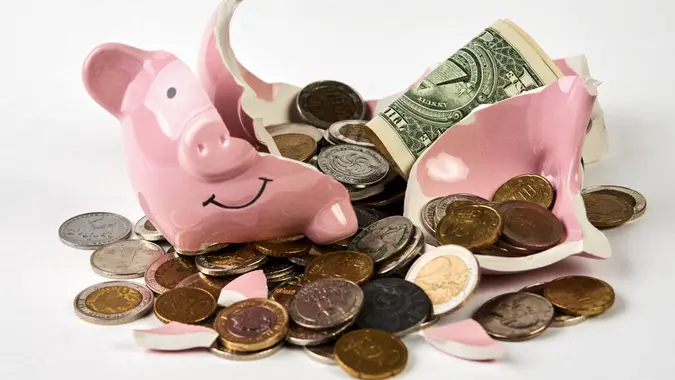Never Keep Over This Amount in Your Bank Account, According to Humphrey Yang

Commitment to Our Readers
GOBankingRates' editorial team is committed to bringing you unbiased reviews and information. We use data-driven methodologies to evaluate financial products and services - our reviews and ratings are not influenced by advertisers. You can read more about our editorial guidelines and our products and services review methodology.

20 Years
Helping You Live Richer

Reviewed
by Experts

Trusted by
Millions of Readers
Watching your bank account balance increase is a good feeling. You’re growing your wealth and probably getting closer to your financial goals. But there comes a point when you can have too much money in your account, according to personal finance influencer Humphrey Yang.
In a new YouTube video, Yang shared how keeping excess cash in your bank account can cost you. Learn how much to keep and why it’s a problem if you do otherwise.
How Much Money Should You Keep in Your Bank Account?
While the specific number will vary from person to person, Yang recommended keeping an emergency fund with enough money to cover the three to six months of expenses plus money that will be used for any short-term goals like buying a house. He added that this should be kept in a high-yield account.
The emergency fund should cover the following:
- Your rent or mortgage payment
- Your basic groceries and essentials
- Your utility bills
- Your monthly outstanding debt payments (if applicable)
This money is there for you to fall back on if you lose your job or an emergency like unexpected medical bills pops up. Yang’s advice is to take any cash beyond this emergency fund total and either devote it to a specific savings goal or invest it. His guideline for whether you should invest or keep the money in a bank account is to only invest money that you won’t need within the next five years, because there’s always the chance of losing the cash you invest.
Why Is Keeping Too Much Money in the Bank a Problem?
Yang gave several reasons why maintaining a high balance in your bank account could be a bad financial move. The first is that a high bank balance may lead you to spending more money.
Overspending
“If you’re out shopping and you see something that you like, like a nice pair of shoes, a designer handbag or even just a phone case, you might not actually need that item, but you might splurge on it” because you know you have the money, he said.
Having the money in your account and being able to responsibly spend it on things you don’t need are two separate things. Especially if, as Yang noted, you run your life from one bank account that contains your emergency fund, house fund and other savings. In that case, your balance is not the same as your available spending money, but it’s easy to forget that while shopping.
Missed Opportunities To Grow Your Money
Yang pointed out that there’s also the issue of your cash not working for you when you carry a high bank account balance. A traditional checking account pays around 0.07% interest, which is barely anything. If you’re leaving all your cash in an account like that, you’re missing out on the chance to grow your money faster through higher-yield investments, such an index fund, high-yield bonds or a retirement account like a Roth IRA or 401(k).
Losing Value to Inflation
The purchasing power of your money decreases over time because of inflation. The current inflation rate in the United States is about 3%.
So, say you have $50,000 in a bank account today. If you leave it there until next year and the inflation rate stays the same, your money would only be able to purchase $48,500 worth of goods or services. You’ve lost value by keeping your money in your bank account.
 Written by
Written by  Edited by
Edited by 

























